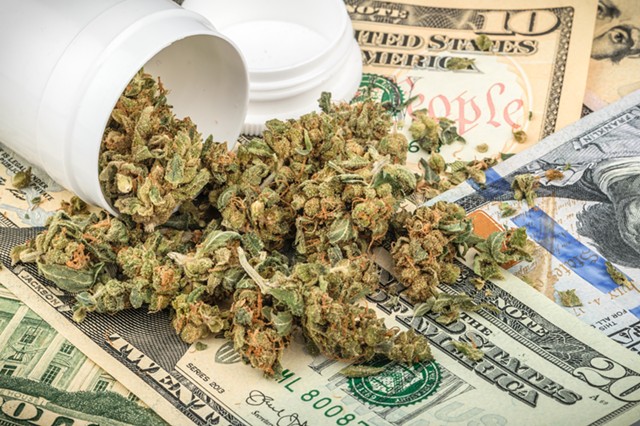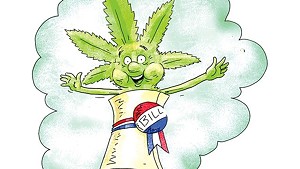Gov. Phil Scott’s task force studying pot policy released draft recommendations this week for how the state should structure a taxed-and-regulated retail cannabis market.
The 88-page report, created by the taxation and regulation subcommittee of the Governor's Marijuana Advisory Commission, recommends a 20 percent excise tax on all retail cannabis sales, in addition to the state’s 6 percent sales tax. Towns could also choose to levy a 1 percent local option tax. The panel recommends that the tax revenue be distributed to cities and towns statewide; it would also pay for the administrative costs of regulating the new market.
Consumers in Massachusetts, which has legalized retail sales, pay 17 to 20 percent in taxes.
Deputy Tax Commissioner Craig Bolio noted that the recommendations are only in draft form and may change before the governor’s commission issues its final recommendations in December.
The report tried to achieve a number of goals with its proposed regulatory structure: “to protect consumers, to prevent the diversion of marijuana to under-age consumers and the black market, and to generate sufficient revenue to self-fund the administrative and public health and safety program costs resulting from marijuana use and sales in the state, all while fostering economic opportunities for Vermonters.”
The recommendations include some key policies designed to establish a diverse local supply of legal cannabis. Under the proposed permitting scheme, the state would offer an unlimited number of licenses for small-scale pot growers and cap the number of medium- and large-scale cultivation licenses.
“At the start of legalized sales, only the smallest tier [of license] would be available, so as to encourage small, local farmers to enter the market,” the subcommittee’s draft recommendations read. “Allowing an unlimited number of the smallest cultivator licenses is important to help bring current growers out of the black market and to integrate them into the legal market. This is also important to encourage small Vermont cultivators, which will help the local economy and employ Vermonters.”
Middlebury attorney and drug policy reform advocate Dave Silberman applauded the approach. He said economies of scale would naturally push an unregulated market toward consolidation, where "all the marijuana in America is grown in one field in Nebraska."
The report also recommends creating five types of licenses: cultivator, processor, retailer, transporter and testing. Businesses or people would be prohibited from holding more than one of each type of cannabis license. That would allow a single grower to process, test, transport and sell their own pot, but would prevent monopolies.
“So I don’t think you’ll see a Starbuds or a McBud on every corner,” Silberman quipped.
Rep. Sam Young (D-Glover) said he plans to introduce tax and regulate legislation in early 2019.
“I’ve been waiting for some of these recommendations to come out … and I’ll incorporate some of their work,” he said. “In the end, we’re going to have to have the governor on board. I’m assuming we don’t have the votes for an override.”
Even though Democrats secured a “veto-proof” majority in the House in last week's election, Young said neither Democrats nor Republicans seem unified around any one cannabis policy. That means a veto from Scott could effectively extinguish any efforts to create a regulated pot market.
“A bill that everybody can agree on is not going to have everything I like in it or everything the Senate likes,” Young said. “And then surely the governor will have things that we don’t like.”
Read the draft recommendations below:
















Comments (5)
Showing 1-5 of 5
Comments are closed.
From 2014-2020, Seven Days allowed readers to comment on all stories posted on our website. While we've appreciated the suggestions and insights, right now Seven Days is prioritizing our core mission — producing high-quality, responsible local journalism — over moderating online debates between readers.
To criticize, correct or praise our reporting, please send us a letter to the editor or send us a tip. We’ll check it out and report the results.
Online comments may return when we have better tech tools for managing them. Thanks for reading.